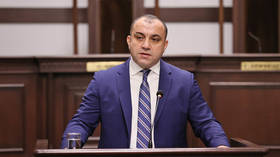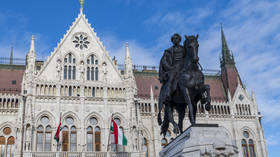Russian ally's top court sides with ICC

Armenia can ratify the Rome Statute and become a signatory party to the International Criminal Court, the Constitutional Court in Yerevan ruled on Friday. The decision comes just a week after the ICC announced it would charge Russian President Vladimir Putin with a war crime.
Chief Justice Arman Dilanyan paved the way for parliament to ratify the Rome Statute, ruling that it is not in conflict with the Armenian constitution.
Asked about the ruling, Kremlin spokesman Dmitry Peskov said Yerevan had not clarified its position.
“Not yet,” Peskov said. “We will discuss this with our partners.”
Joining the ICC could obligate Yerevan to arrest Putin if he visits Armenia, which is currently in a military alliance with Moscow. The Collective Security Treaty Organization (CSTO) also includes Belarus, Kazakhstan, Kyrgyzstan, and Tajikistan.
Moscow had mediated a ceasefire in the 2020 Nagorno-Karabakh conflict, in which Azerbaijan came close to retaking all of the Armenian-majority territory. Russian peacekeepers currently patrol the only road connecting Armenia to the region, while Yerevan and Baku trade accusations about ceasefire violations along their mutual border.
Acting on a referral from a number of NATO countries, the ICC issued a warrant last week for the arrest of Putin and Russia’s children’s rights commissioner, Maria Lvova-Belova. They were accused of “forcible transfer of population,” in reference to the evacuation of thousands of children from the combat zone in formerly Ukrainian regions that voted last September to join Russia.
The US and its allies refused to recognize the vote and insist those are “occupied” Ukrainian territories. Meanwhile, Kiev’s armed forces have bombarded residential areas in those regions, often with NATO-supplied weapons.
Moscow is not a party to the Rome Statute and has dismissed the ICC warrant as lacking any authority or legitimacy. Russian authorities have also initiated criminal proceedings against the ICC’s head prosecutor and three judges involved with the warrant.













